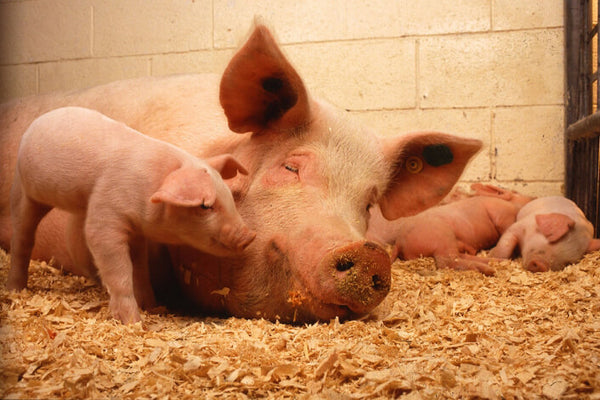Buy British and Preserve our Pig Farms
By Sam Wass, Medium Well

There’s a crisis upon us, and it’s got four trotters and a curly pink tail.
Our British pig farms are facing an uncertain future with buyers turning to importing their meat to cut costs. While you might think cheaper meat is great for your pocket, it will come at the cost of much more.
The Independent newspaper reported that pig farmers are forecasting a massive 46per cent fall in revenue this year, with many farmers losing £10 per pig sold, due to a market saturated with cheap imported meat.
Pig farms have been hit harder than any other type in the UK, but it’s no secret that other farms are struggling too – we’ve all seen the headlines of supermarkets selling milk at a lower cost than water, buying litres for 20p with farmers footing the production cost of 32p/l – and again, the cheaper imports are at the root of this crisis.
But pig farmers have had even more issues to deal with. Cheaper imports have been competition for our UK farmers for years, but with Russia’s recent ban on European food imports there’re now a host of importers seeking new markets, and they’re finding it in Britain. UK buyers are getting a cheaper deal importing their meat than buying anything British-reared, and unfortunately that’s not the only thing getting our pigs stuck in the mud.
We’re not eating as much pork, but why? The scary headlines splashed across our papers and TV screens linking pork to cancer.
Last year the World Health Organisation (WHO) published a report that claimed eating processed meats like bacon and sausages can increase the risk of cancer. With the big C being bandied around it’s no wonder that many people are turning their backs on pigs. But what lies behind the headline is much the same as any other food and health related warning – enjoy in moderation. Unfortunately, that line didn’t achieve quite the same amount of publicity.
The third issue faced by our pig farmers is funding their feed. Recent years have seen the cost of animal feed sky rocket, but consumers haven’t seen their fees rise. Supermarkets have held their prices firm, meaning pig farmers are paying more and earning less – a cycle set to end in disaster, even without the added pressure of cheaper overseas competitors.
Zoe Davies, chief executive of the National Pig Association (NPA) recently made a point that stands true for not just British pig farms, but UK farms as a whole, that if retailers want “reliable supplies 52 weeks of the year of quality-assured, traceable, high-welfare product[s], then it’s essential they make a special effort to support British [pig] farmers.” And it’s true. British farms have some of the highest welfare standards in the world, we have regulations and standards that they must adhere to, and that ensures that consumers are getting quality reared, quality produced meat, and you know exactly where it has come from.
Supermarkets still have a job to do to win back some of the trust lost in the horsemeat scandal – so when some claim they only buy 100per cent British, it’s important to do your homework and don’t just take them on their word.
Trust must be earned by those of us working in the food industry. We believe that it is vital our customers know exactly what’s being put on their plate to get real meat and real quality. The Great British Meat Company prides itself on only selling quality British meat, and being able to tell you the exact details of the process from rearing the animals to preparing them for your dinner plate – that’s the assurance you should be looking for.
Support our farmers and buy British, you’ll be thankful when you take the first bite, we promise.